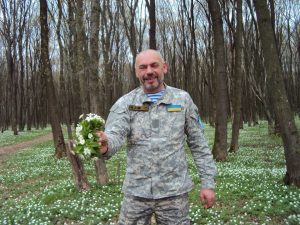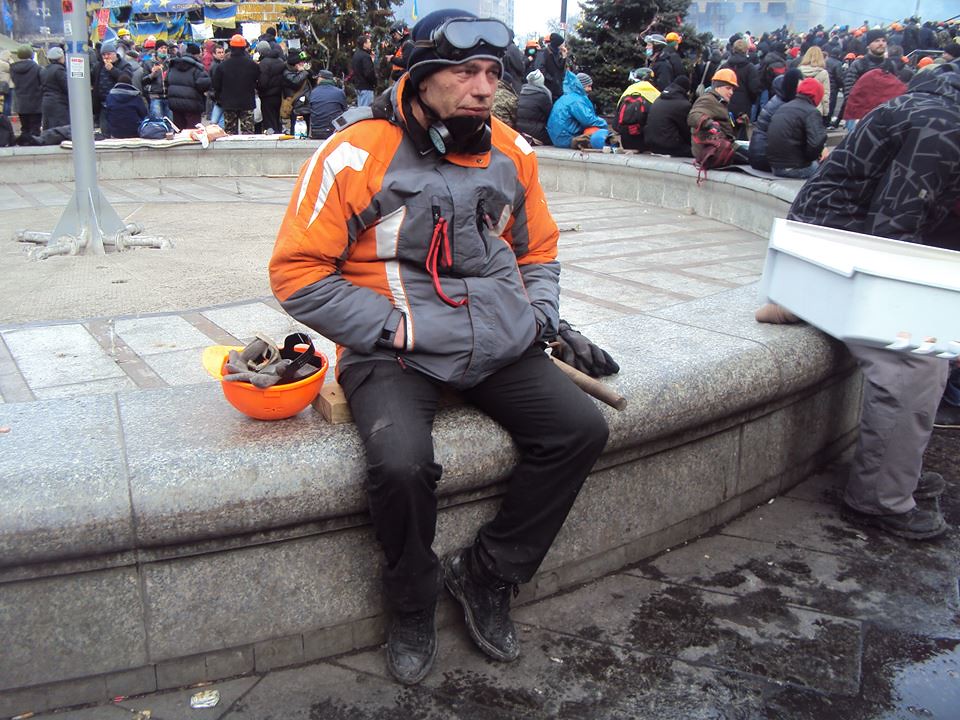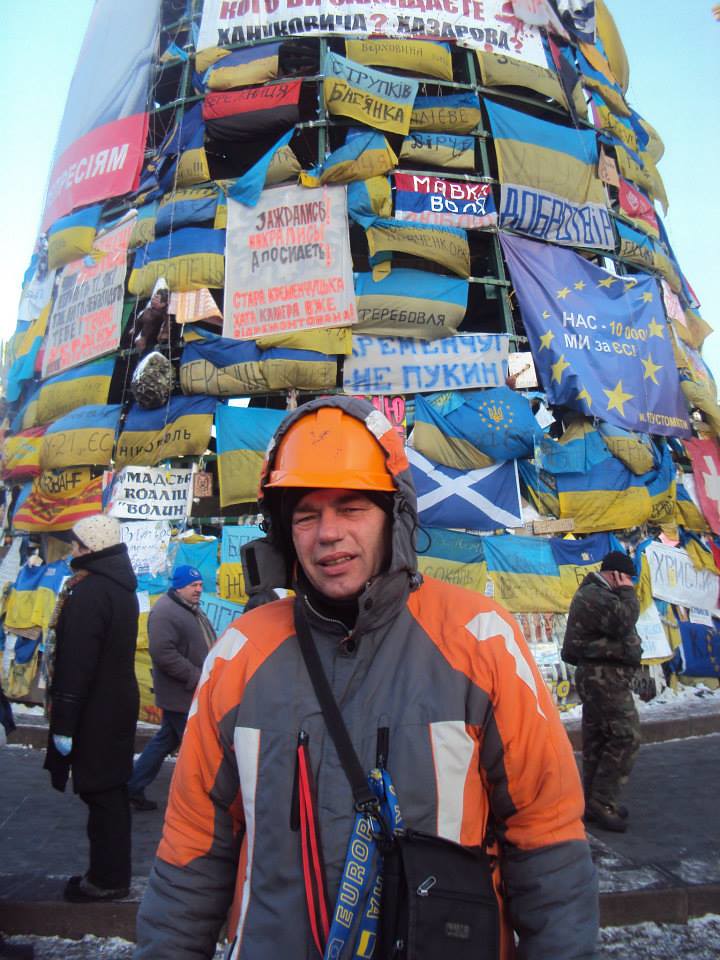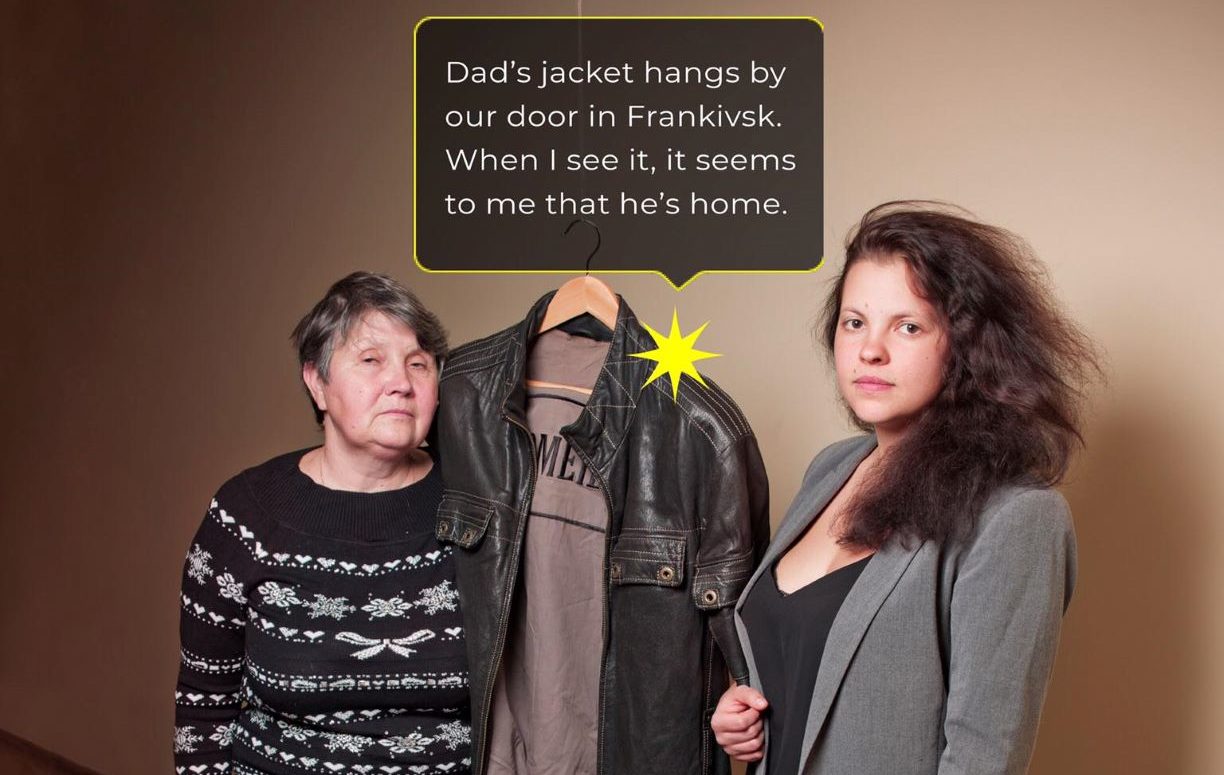On May 28, 2015, Vasyl was fatally wounded when a tank missile hit the Ukrainian defensive position at Shakhta Butivka near the village of Vodiane, Donetsk Oblast. For forty minutes, medics tried to save Vasyl’s life, but God embraced him into His arms. On May 30, 2015, Vasyl Kindratsky was buried in the honourary burial grounds No. 76 at Lychakiv cemetery in Lviv.
It is part of the Plus 1 project created to memorialize the fallen Defenders of Ukraine.
KINDRAT
Author: Vasyl Shkliar
“Bless me, Father, for I am about to die for Ukraine,” he said quietly, but firmly.
January 9, 2014. Vasyl Kindratsky had left the Kyiv Maidan and was now home in his native Mykolayiv, Lviv Oblast just in time for Christmas. He wanted to spend the Christmas holidays with his family. On January 9, he went to see Father Yaroslav in the village of Bilche, twenty kilometres from Mykolayiv. Father Yaroslav greeted him warmly, but his whole body froze on the spot when Vasyl asked for benediction. The war had not yet begun, blood had not yet been shed on Kyiv’s central square… And yet, Vasyl fell to his knees and pleaded solemnly:
“Bless me, Father…”
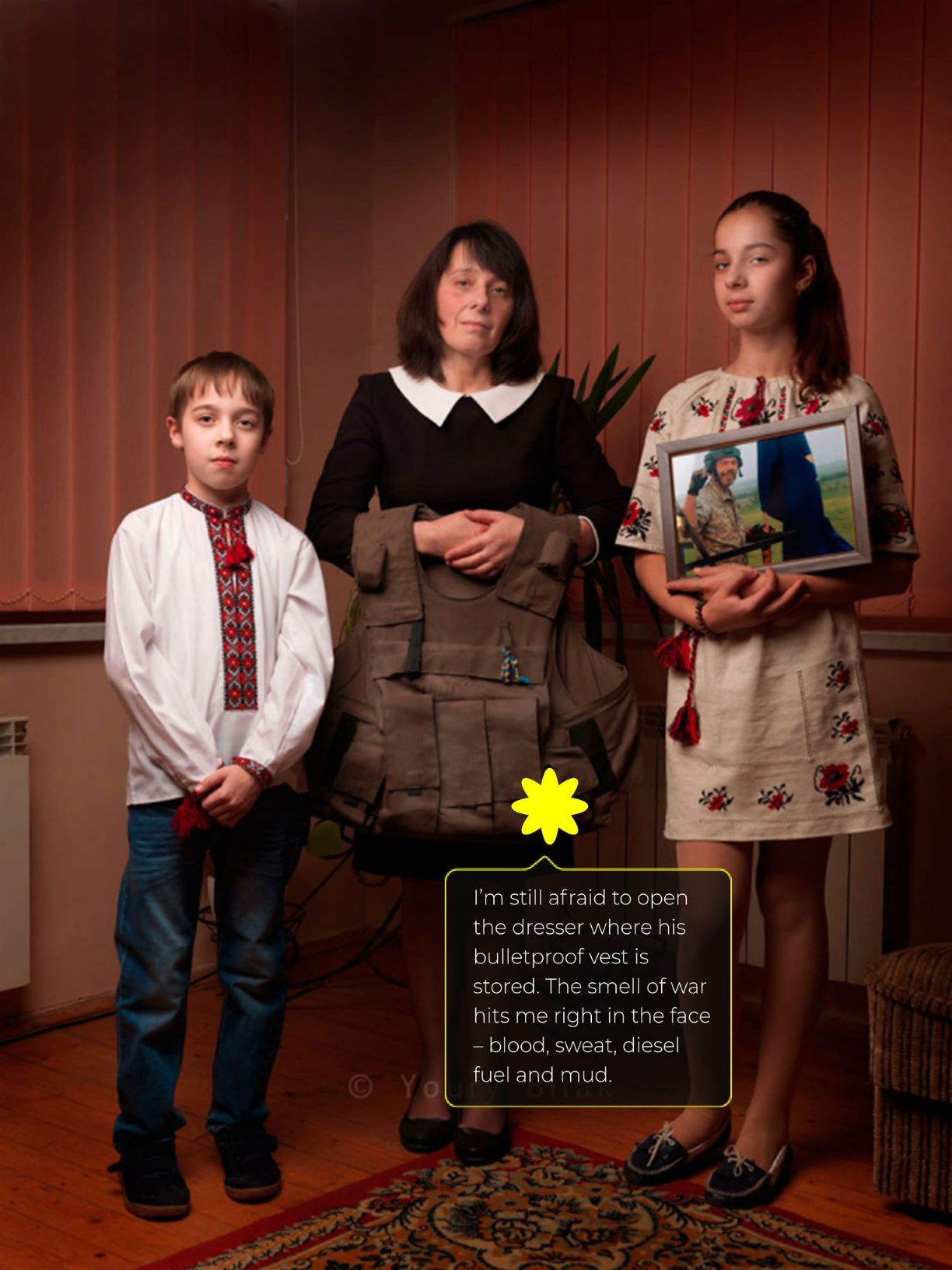
Father Yaroslav was taken aback. If a defiant young man had been standing in front of him, he would have found a proper reply. But… here stood a fifty-year-old man, his peer and close friend since the Orange Revolution, a man who had managed the Mykolayiv district state administration for five years.
“Your request is plain madness,” said Father Yaroslav. “God chooses the Lamb to be sacrificed. So, who are you to tell Him what to do? Andrey Sheptytsky once asked the Pope to bless the martyrs, but the Pope refused. I can only bless someone for his toils and sweat.”
Vasyl shook his grey-streaked head.
“My father told me that freedom comes at the cost of blood. When independence was proclaimed, people were so happy; they cried for joy, but Dad said it was too early to rejoice. There is no freedom without blood!”
“But, you have a wife, two children…”
“God will take care of them,” Vasyl said with a sad smile.
He and his wife Halya had children late in life. He was already in his forties, but still there were no children. In 2004, he erected a statue of the Mother of God in Mykolayiv…and it happened. First, their daughter Anhelina was born, and three years later, their son Yaroslav.
On February 20, 2014, when blood was spilled on the Maidan, his wife called him:
“Vasylko, don’t forget that you have two children… Take cover! Hide as best you can!”
But, he didn’t hide because he knew he had the best children in the world and that he loved them more than anyone else.
God had mercy on him when they were on the Maidan. He and his comrade, Andriy Yurha arrived at the OUN Battalion in Pisky on November 20. Andriy was also fifty years old, a successful businessman with a fourteen-year-old son, Yurko. People might say that it was Vasyl who persuaded Andriy to go to war. But, this was not true. A volunteer fighter makes the decision alone, and goes to war alone. That’s why he’s a volunteer.
In Pisky, they were met by fifty-year-old Deputy Commander “Karmeliuk”, more widely known in Ukraine as poet and war veteran, Borys Humeniuk.
“Hey, guys, what are you doing here? Are you really as foolish as me?”
“Karmeliuk” laughed loudly, although he firmly believed that older men, who are already parents and have experienced life, should be the first on the front line.
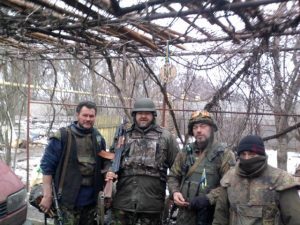
Andriy Yurha took the call sign “David”, and Vasyl Kindratsky – “Kindrat”. At first he wanted to be called “Lys” (Fox), like his grandfather who had served in the Ukrainian Insurgent Army (UPA), but the battalion already had a “Fox”. So, he became “Kindrat”.
There is no freedom without blood. His brother-in-arms Andriy Yurha (“David”) was killed three days later. A shell from a self-propelled artillery unit hit the wall of the house where the OUN fighters were spending the night. This time, God chose David.
Kindrat and Sashko, call sign “Kombat” brought Andriy Yurha’s body home to Lviv in a jeep. The coffin barely fit into their vehicle. It rested on the windshield and against the shoulders of the driver (Kindrat and Kombat took turns driving) and the front seat passenger.
Their jeep ran out of diesel fuel on the Kharkiv highway near Yahotyn. Luckily, Karmeliuk was in Kyiv then, so he drove out to help tow their jeep to the nearest gas station. The Way of the Cross continued…

Kindrat, my brother… “Brother” is the word you used. That’s how you addressed your friends. I remember you telling me about this journey when you came to visit at Vodokhreshche (Epiphany). You were in Kyiv on business. You came with a sad smile on your face and a heavy backpack full of “war souvenirs”. The house reeked of gunpowder from used bullets, shell casings and shrapnel. Another day, you even brought me a huge fragment from a Grad shell. You laughed and said I could use it as an ashtray. In truth, your heart was crying out over the war… that it was war, not somewhere beyond the seven seas, but so near, a short distance between life and death.
You spoke about your brothers… about Syvyi, Kombat, Karmeliuk, Krom, Lieshy, Khan, and most of all about David – Andriy Yurha, whom you did not drive, but carried home on your shoulders from the Donbas, and then, upon returning to Pisky, you found his cap amidst the destruction.
You talked a lot about organizing combat units of reliable people in the rear, because this war would last a long time, and even if we continued our unfinished revolution, we should prepare infantry units back home. You used OUN terms, a true spokesman for your battalion.
Then, we went to seek blessings at St. Nicholas Church near Askold’s Grave. Who could have imagined that four months later, your brothers-in-arms would bring you back to this church…
When a heated debate broke out among the OUN fighters whether to remain as a volunteer unit or be incorporated into the regular Ukrainian army, Kindrat sided with the official army. At that time, he was Deputy Commander, and despite his distrust of the Army High Command and the government, he understood the need to build and strengthen the Ukrainian army. Kindrat had served as a paratrooper in the Soviet Army and knew the importance of discipline and professional training. Thus, some OUN battalion members became regular soldiers in the 81st Airborne Assault Brigade.
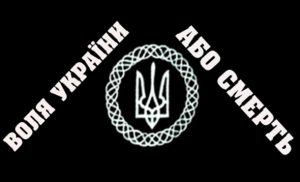 On April 25, in Chyhyryn, we met at the ceremony commemorating the Heroes of Kholodny Yar*. Many soldiers came from the front to pay tribute to the Ukrainian insurgents who were the last to fight for an independent Ukrainian state before its takeover by the Soviet Union. From these heroes, they adopted the motto “Freedom of Ukraine or Death”. The traditional consecration of weapons near the Haydamatsky pond was more than just a symbolic ritual.
On April 25, in Chyhyryn, we met at the ceremony commemorating the Heroes of Kholodny Yar*. Many soldiers came from the front to pay tribute to the Ukrainian insurgents who were the last to fight for an independent Ukrainian state before its takeover by the Soviet Union. From these heroes, they adopted the motto “Freedom of Ukraine or Death”. The traditional consecration of weapons near the Haydamatsky pond was more than just a symbolic ritual.
One month later, at dawn on May 25, 2015, Kindrat risked his life by climbing to the top of a half-destroyed mine shaft and hoisting two flags – the Ukrainian flag and the OUN banner. He caught his breath as he looked up and saw the city of Donetsk and the vast Ukrainian steppe. The next day, he phoned his wife Halyna and in an excited, joyful voice, told her about the incident, as if announcing the end of the war. He didn’t say, “I hoisted the flags…, but “We…”. Two days later, a Russian tank based at Donetsk Airport began incessantly shelling the Shakhta Butivka position near the village of Vodiane. A projectile pierced the wall and sandbag-shielded windows. Kindrat was mortally wounded. For forty minutes, the medics tried to save him. But this time, God embraced Kindrat into His arms. That’s how it is, brother. I would like to tell you more, but you can see everything from up there. You never had time to read your seven-year-old son Yaroslav’s school essay, which he wrote for the Day of Heroes. Yaroslav entitled it ‘My Undefeated Father’. Here, my brother, let’s read it together: “My father went to war. Dad and his friends fought the enemy in the village of Pisky near Donetsk Airport… Dad sometimes returns home on leave because he misses us very much. Mom virtually blossoms when he arrives. My sister Anhelinka and I listen to his interesting stories about the war. I really like my Dad’s uniform… I’m very sad when Dad has to return to the front line. He says he must fight to the end, until Ukraine wins the war. My Dad is a patriot, an undefeated fighter for his Homeland. I respect and love him. Come back to us, Father, come back alive and healthy.” Young Yaroslav wrote this essay five days before you died. But you see, brother, what a wonderful son you have? Be joyful! Here’s your brother, Karmeliuk; listen to what he says: Kindrat… Your daughter has grown so much, Your children have grown up so fast But, you can see everything from up there, Your son is the spitting image of his father. I didn’t have the courage to approach And pat him on the head. When the time comes, I’ll tell him about you. You probably heard what your beloved Halyna said at the inauguration of the memorial plaque on the district state administration building in Mykolayiv, where you once worked. She said: “Vasyl was always where he needed to be!” Do you now understand why she didn’t try to stop you when you went to war? You heard everything at the ceremony, and maybe even smiled sadly when she said those words. Today, all of Ukraine, for which you shed your blood, smiles sadly. The project is built around 22 individual exhibition stands. In iconic and powerful moments captured by a photographer’s camera – Youry Bilak, a Frenchman of Ukrainian descent – Ukrainian families tell the stories of their loved ones – Ukrainian soldiers who perished in the war. Each narrative, each individual is but one small grain, one tiny unit of a module in a living organism. By telling his story, we bring him back to life. Each family chose an object that most reminds them of their departed: a father’s jacket, a guitar, a suit of medieval armour, a book. These family artifacts reflect a living continuation of the departed loved one. Ukrainian artists, intellectuals, and journalists were invited to create original texts about each soldier.